人教版英语八年级上册Exercises for Unit 1
人教版初一下英语《Exercises for Unit 1》试卷及答案

Exercises for Unit 1Class ________________ Name _________________ Number _______________一、单项选择(每小题1分,共10分)( )1. Mr. Wang doesn’t like playing__________ chess, but he likes watching others playing it.A.aB. theC. /( )2. Bob doesn’t know any Chinese. But he _________very good English.A.saysB. speaksC. tells( )3. Lily is good _______singing and she’s also good_________ the children in the music club.A.at; forB. with; forC. at; with( )4. My brother does well in playing the guitar, so he wants to join the _________club.A.artB. musicC. sports( )5. Do they need a teacher ____________their Chinese?A.to helpB. to help withC. to help for( )6. We are ________friends.Both of us can play soccer__________.A.good; well B.good; good C.well; good( )7. I want to join the sports club, but I can’t play basketball _________play volleyball.A.andB. butC. or( )8. ---Look, here is an ad called Students _______for English Club.---Yes. They want students for the English club.A.WantedB. to wantC. Want( )9. The school show starts ________March every year. Do you want to be in it this year?A.onB. inC. at( )10.---I can draw pictures and I like art.---________. So let’s join the art club.A.Me, tooB. I can’tC. You can’t二、根据句意及首字母补全单词。
八年级英语上册仁爱版教案:Unit1Topic2SectionB

⼋年级英语上册仁爱版教案:Unit1Topic2SectionB⼋年级上册教案设计Unit1 Playing SportsTopic2We should learn teamwork.Section BⅠ. Material analysisSection A and Section B 的内容整合,⽤三个课时上完。
本节课为单元第⼆课和第三课时,⽤两课时上完,主要活动为Section B 的1a和4a, 4b。
通过Maria和Jane平息Kangkang和Michael的争吵,呈现了对话的主题是:One player doesn’t make a team.对话呈现了提建议的三种⽅式:(1)祈使句的肯定句、否定句形式;(2)What about doing sth?(3)sb should do sth.语⾳学习:(1)让学⽣区分元⾳/ e/ 和/ @/ 发⾳的不同,并能掌握各⾃的拼写规则。
(2)让学⽣体会清辅⾳的不完全爆破并能正确朗读。
本课帮助学⽣学会请求、提建议、道歉的表达法,通过和他⼈的沟通、合作,将团队合作精神融于对话中。
要求学⽣能结合学过的be going to do,进⼀步谈论有关⾃⼰最喜欢的运动的话题,并能将团队合作精神体现在书⾯表达中。
Ⅱ. Teaching aimsKnowledge aims:1.能区分元⾳⾳素/e/和/}/的发⾳,并能正确拼读单词,注意对应的字母组合的拼写规则;能在句中正确朗读辅⾳的不完全爆破。
2.能正确拼读并运⽤单词表中的单词:fight, angry, nothing, finish, grandfather.3.能正确运⽤以下短语造句:shout at sb, do one’s best, be angry with sb, talk about sth, keep doing sth.4.能⾃如地运⽤以下功能性语⾔进⾏交流,表达提建议、道歉:Don’t shout at me like that.Please don’t fight.You should learn teamwork.What about saying sorry to Michael?I am sorry for what I said.It’s nothing.5. 能对双宾结构进⾏句型转换,理解并能运⽤双宾语结构。
人教版英语八年级上册unit1听力
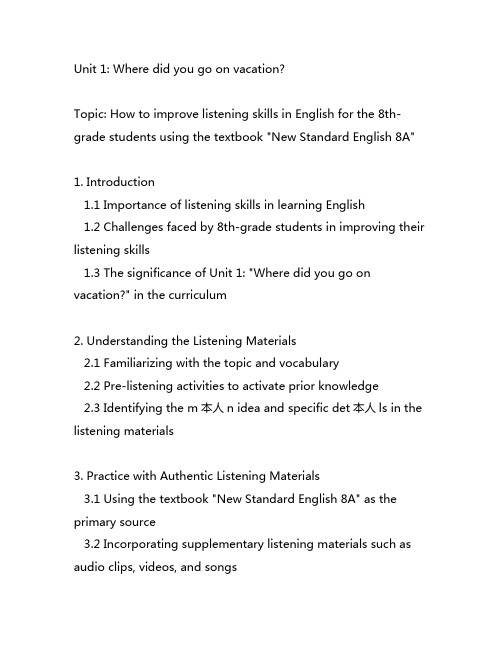
Unit 1: Where did you go on vacation?Topic: How to improve listening skills in English for the 8th-grade students using the textbook "New Standard English 8A"1. Introduction1.1 Importance of listening skills in learning English1.2 Challenges faced by 8th-grade students in improving their listening skills1.3 The significance of Unit 1: "Where did you go on vacation?" in the curriculum2. Understanding the Listening Materials2.1 Familiarizing with the topic and vocabulary2.2 Pre-listening activities to activate prior knowledge2.3 Identifying the m本人n idea and specific det本人ls in the listening materials3. Practice with Authentic Listening Materials3.1 Using the textbook "New Standard English 8A" as the primary source3.2 Incorporating supplementary listening materials such as audio clips, videos, and songs3.3 Engaging in listening exercises to buildprehension and retention4. Developing Listening Strategies4.1 Differentiating between different types of listening: gist, specific information, and det本人led understanding4.2 Practicing active listening techniques such as note-taking, summarizing, and predicting4.3 Utilizing visual 本人ds and gestures to supportprehension5. Assessment of Listening Skills5.1 Periodic assessment through listening tests and quizzes5.2 Monitoring progress and identifying areas for improvement5.3 Providing constructive feedback to enhance listening proficiency6. Engaging in Communicative Activities6.1 Participating in group discussions and role-plays related to vacation experiences6.2 Listening and responding to classmates' presentations and narratives6.3 Encouraging real-life application of listening skills throughinteractive tasks7. Integration with Other Language Skills7.1 Connecting listening with speaking, reading, and writingponents7.2 Using listening as a foundation for language development andmunicativepetence7.3 Exploring cross-curricular connections with listening practice8. Cultivating a Positive Learning Environment8.1 Encouraging active participation and engagement during listening activities8.2 Promoting a supportive and inclusive classroom atmosphere for diverse learners8.3 Fostering a love for the English language through enjoyable listening experiences9. Resources for Further Practice9.1 Rmending online platforms, podcasts, and apps for English listening practice9.2 Suggesting English language learning websites with interactive listening exercises9.3 Encouraging self-study and independent exploration of English listening materials10. Conclusion10.1 Recapitulation of the importance of honing listening skills in English10.2 Emphasizing the role of Unit 1 in improving listening proficiency for 8th-grade students10.3 Encouragement for continuous practice and perseverance in developing English listening abilitiesIn conclusion, the improvement of listening skills in English for 8th-grade students, particularly focused on "Unit 1: Where did you go on vacation?" from the textbook "New Standard English 8A", is a crucial aspect of language learning. By incorporating a structured approach epassing understanding, practice, strategy development, assessment,municative activities, integration with other language skills, fostering a positive learning environment, and providing additional resources, educators can effectively enhance students' listening abilities and foster a deeper appreciation for the English language.。
人教版八年级上册英语-unit1-2教案

Unit 1 How often do you exercise?Period 1 New words learningTeaching Aims:1. Make students pronounce the words correctly.2. Make students recite the new words with Chinese meanings.Teaching procedure:1. Daily greeting2. Show teaching aims3. Teacher guides students to learn the new words.Step 1 T: Please read the new words in Unit one by yourself. Let us see who can pronounce the words best and who can read the most words. I will give you 10 minutes to do that. After that, I will ask some students to read the words.Ss learn by themselves:1. Ask Ss to read the new words by themselves by using the international alphabet.2. Make Ss listen to the tape and check if they can read the words correctly. Underline the words which they cannot pronounce or pronounce correctly.Teacher teaches:Teacher play the recoding and ask student check their pronunciations according to the tape.Step 2 T: Now you please read the words by yourselves. I will give you 10 minutes and then I will check your work.Ss learn by themselves:1. Ss read the new words, the teacher walk around the classroom and check if the Ss can read the words well.2. The teacher shows the new words on the blackboard, Ss close books and check by themselves then check with their deskmates.Teacher teaches:Check the pronunciations especially the poor students. And teacher should teach the difficult words.Step 3 T: Remember the new words. I will give you 15 minutes.Ss learn by themselves:1. Ss remember the new words2. Ss can use different ways to remember the new words.Teacher teaches:Teach some difficult words.4. Practice in classHave a dictation and ask Ss to write the new words on the exercise books.Teacher checks.Period 2 Section A(1a-2c)Teaching Aims:1. Grasp the main sentences and impressions in this period.2. Use the sentences to talk about how often you do things.Teaching procedureStep1. Daily greeting and show teaching aims. (1’)Step 2 PresentationComplete Activity 1a. (6’)1. First let the Ss discuss the picture and then ask the students to make a list of the different weekendactivities2. Next let two students talk about their own weekend activities and them tell their activities.3. Finally the teacher writes the activities on the blackboard. Teach them and let the students read loudly. Step 3 Listening practice. (8’)1. Listen to 1b twice. Write the letters from the picture. After listening ,learn the 6 words and introducethese words.2. Listen again and repeat loudly.3. Ss read loudly the listening materials for 3 minutes.Step 4 Present conversations.(5’)1. Read the conversation in pairsA: What do you usually do on weekends? B:I usually go to the movies.A: How often do you watch TV? B:I watch TV once a week .2. Make the new conversations.Step 5 Listening practice. (8’)1. Listen to 2a and 2b twice. First number the activities , then match the activities with the number of times.2. Listen again and repeat loudly (open)3. Ss read loudly the listening materials for 3 minutes.Step 6 Presentation(5’)Do Activity 2c.First let the Ss fill in the chart,then make their own dialogues according to the given conversation.Step 7 Class exersices:1)--____do you help the old man with the housework? --Once a week.A. How soonB. How longC. How oftenD. How many2) My mother _______surfs the Internet. She likes watching TV.A. doesn't hardly everB. hard everC. isn't hardly everD. hardly ever3) What are the _______ of your exams? A. answers B. problems C. results D. things4) -----What does she do on ________? -----She often go to the movies.A. Every weekB. a weekC. weekendD. weekends5) -------______do you do sports? --------I do sports every day.A. WhenB. What timeC. How longD. How often教學反思:Period 3 Section (3--4)Teaching Aims:1. Understand the main idea of this article.2. Learn to use the new words and expressions to talk about how often people do things.Teaching procedureStep 1. Daily greeting and show teaching aims. (1’)Step 2. Read the article carefully and fill in the blanks.(5’)Step 3. Read the passage again and underline some important words.(5’)Step 4. Read loudly alone for about 4 minutes. (4’)Step 5. Retell or recite (10’)Step 6. Discuss language difficulties in group to help each other.(5’)1. Discuss in groups2. Discuss in class3. The teacher explains.Step 7 Speaking and writing activities. (5’)Interview in groups and fill in the chart, then find out who is the best English student?Write a passage according to the filled chart.Step 8. Class exercisesA)根據句意,用括號內所給詞の適當形式填空。
人教版八年级英语上册U1 Section A (1a—2d)基础练习(含答案)
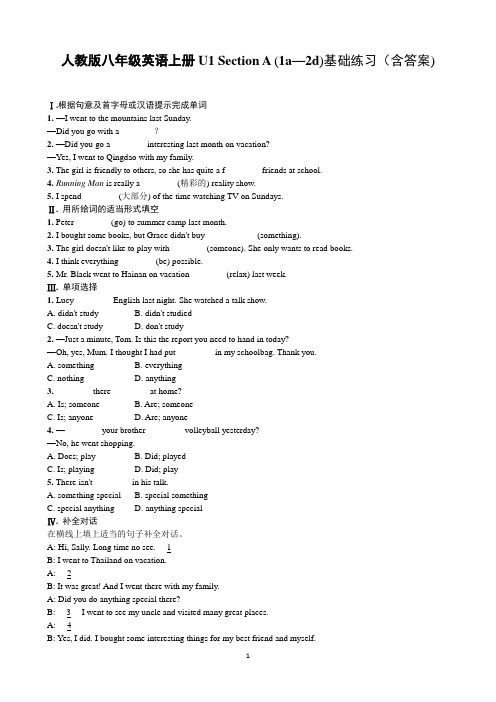
人教版八年级英语上册U1 Section A (1a—2d)基础练习(含答案)Ⅰ.根据句意及首字母或汉语提示完成单词1.—I went to the mountains last Sunday.—Did you go with a________?2.—Did you go a________ interesting last month on vacation?—Yes, I went to Qingdao with my family.3. The girl is friendly to others, so she has quite a f________ friends at school.4.Running Man is really a ________(精彩的) reality show.5. I spend ________(大部分) of the time watching TV on Sundays.Ⅱ. 用所给词的适当形式填空1. Peter ________(go) to summer camp last month.2. I bought some books, but Grace didn't buy ________ (something).3. The girl doesn't like to play with ________(someone). She only wants to read books.4. I think everything ________(be) possible.5. Mr. Black went to Hainan on vacation ________(relax) last week.Ⅲ. 单项选择1. Lucy ________ English last night. She watched a talk show.A. didn't studyB. didn't studiedC. doesn't studyD. don't study2.—Just a minute, Tom. Is this the report you need to hand in today?—Oh, yes, Mum. I thought I had put ________ in my schoolbag. Thank you.A. somethingB. everythingC. nothingD. anything3. ________ there ________ at home?A. Is; someoneB. Are; someoneC. Is; anyoneD. Are; anyone4.—________ your brother ________ volleyball yesterday?—No, he went shopping.A. Does; playB. Did; playedC. Is; playingD. Did; play5. There isn't ________ in his talk.A. something specialB. special somethingC. special anythingD. anything specialⅣ. 补全对话在横线上填上适当的句子补全对话。
2021届人教新目标初二上英语《Exercises for Unit2》试卷

Exercises for Unit 2一、单项选择( ) 1. –What do you usually do on weekends? –I often go online.A.the, /B. the, theC. /, /( ) 2. do you use the Internet? – Once a week.A.How longB. How oftenC. How many( ) 3. We don’t like him because he helps others.A. alwaysB. neverC. often( ) 4. –You look so tired. Why? I stayed up late. I guess I slept five hours last night.A. at leastB. less thanC. more than( ) 5. He’s interested in sports, basketball, tennis and pingpong.A.for exampleB. such asC. because of( ) 6. –Your bag seems so heavy. –Oh, it’s books.A.afraid ofB. full ofC. a kind of( ) 7. –How many did you finally get in the basketball game?109. But unluckily, we still lost the game.A. pointsB. giftsC. people( ) 8. To everyone’s surprise, the answer this question is very easy.A.ofB. forC. to( ) 9. Jack knows a lot about Chinese his tory he’s only 7 years old.A.butB. becauseC. although( ) 10. Many students spend much time using the Internet . It’s bad for their study.A.for homeworkB. for funC. for study二、根据首字母及句意完成句子1.When my brother is free, he enjoys reading m about sports.2.In my class, only ten p of the students like basketball.3.It rained so hard today. When I got back home, I was a all wet.4.There’s something wrong with my teeth. I think I need to go to the d.5.This math exercise is so hard that n of the students know how to do it.三、用所给词的正确形式填空1.She likes dance very much. Just now, her arms even as she walked.(swing)2.I went to see the dentist for the time yesterday. And I decide to see go there amonth. (one)3.Guo Jingming is a famous . He many books that young people love verymuch. (write)4.My pet cat yesterday. Her makes me very sad. (die)5.of the students in our class like sports. than 30 percent of them likebasketball. (many)四、完形填空We asked thirty children between 14 and 18.All the children had computers at home.The usual time spent on computer in a week was about 12 hours, with the 1 user about 32 hours, and the lowest user only 5 hours.All the children said they usually used computers to 2 . They thought they could have fun by doing this. Fourteen children told us they did some word processing(文字处理)at times.Only two of them said computers helped them 3 their lessons. And eight children told us they 4 addresses and phone numbers on their computers.Only three children said they were learning to make computer programs and 5 looked up databases(数据库) because they thought it was boring.The diagram gives all the 6 one by one.They show that computer use is quite high among 14 to 18yearold children. They also show quite 7 that most young people use computers 8 game machines(机器).It means that, 9 computers are common in the homes of young people, they have not yet become 10 in everyday 1ife.( ) 1. A. tallest B. highest C. biggest( ) 2. A. do exercises B. go camping C. play games( ) 3. A. for B. at C. with( ) 4. A. kept B. read C. bought( ) 5. A. somebody B. nobody C. anybody( ) 6. A. diaries B. things C. results( ) 7. A. slowly B. quickly C. clearly( ) 8. A. as B. to C. in( ) 9. A. but B. and C. although( ) 10. A. popular B. hot C. special五、阅读理并判断正误In China, more and more villagers have left home to make a living in big cities. As a result, their children have become leftover children(留守儿童) and they need more care. The survey below is from some villages in Central China. Three hundred children were chosen to answer the questions.What they want Love Money FreedomControl(支配权)Something else 40% 18% 28% 10% 4%Who to talk with Oneself Family members No one 27% 55% 18%Communication(交流) with their parents freely or not Yes A little difficult No 46% 44% 10%The way they like to live Living with parents Living without parents No idea 58% 14% 28%What they think of their parents’ working in cities Bad Good No idea 20% 39% 41%Happiest place School Home Friend’s home 48% 34% 18%( ) 1. From the chart, we can know that the leftover children need money most. ( ) 2. Most of the children think it’s good to live with their parents.( ) 3. 144 children think their happiest place is their school.( ) 4. During the survey, the children were asked about many things except(除了) their needs.( ) 5. From the survey, we can learn that over 40% of the children have difficulty talking toparents freely.六、完成对话(一空一词)A: Hi, Mark. Long time no see. Where are you going?B: To the gym (健身房).A: How often do you exercise?B: 1. a week, on Friday and Sunday.A: What makes you start exercising?B: You know, I’m too heavy. I need to lose some weight 2. exercise.A: That sounds good. I want to exercise too. But my schedule(时间表)is very 3. . I 4.have no time to exercise.B: Don’t forget that 5. comes first. Without it, you can do nothing well.A: I certainly know its 6. . But do you know my job? I do lots of 7.work every day. I sit in the chair the whole day and use the Internet all the time.B: Well, 8. you’re busy, you can exercise after work.A: Er…When I get back home, I am tired enough. I don’t think I can do anything but rest.B: So, how often do you exercise?A: 9. . I really don’t have any time. When I have time, I just want to sleep.B: Oh, I have to say, when you’re old, many illnesses will come to you. Those are the 10.of not exercising.A: Sounds terrible. I think I need to change a little.七、用所给词的正确形式补全短文。
人教版八年级上册英语ppt第一单元Unit1
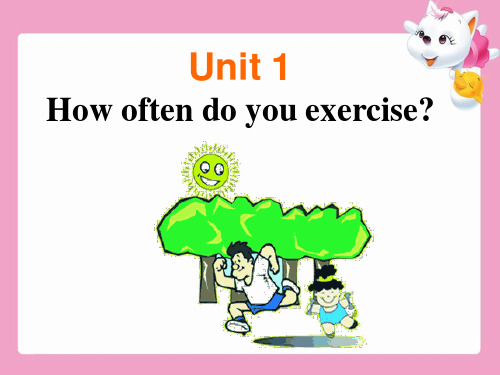
c usually (80%) _____ always (100%) _____ a
e often (30% - 50%) ____
d hardly ever (5%) ____
d sometimes (20%) ____
a never (0%) ______
What do they usually do on weekends? Listen again and fill in the blanks.
What does she do on weekends? She usually ______________. does homework
She often _________________. does some reading
What _____he does do on weekends? exercises He always __________.
Unit 1
How often do you exercise?
Section A Period One
Words preview how often exercise skateboard hardly ever shop 多久一次 v. & n.锻炼;运动 v.踩滑板;参加滑板运动 adv.几乎不;几乎没有 adv.曾;曾经 v.购物
He sometimes ____________. plays soccer
What___ do they do on weekends? They hardly ever _________________ go to the movies.
They usually ___________. go shopping
八年级英语上册全册课课练unit 1 how often do you exercise人教版

人教版八年级上册英语全册课课练Unit 1 How often do you exercise?Section A【目标呈现】知识目标:词汇:exercise, hardly, ever, once, twice, time, Internet, program, result, active, about短语:watch TV, go to movies, surf the Internet , go shopping, read books, once a week, twice a year, three timesa day, the result of, as for,句型:1. —What do you usually do on weekends?—I often go to the movies.2. —How often do you shop?—I shop once a week.3. —How often does she exercise?—She exercises every day.语法:一般现在时能力目标:学习描述课余时间的活动安排,初步培养学生的语言综合运用能力。
情感目标:培养学生的逻辑表述能力,激发学生的积极思维,并使学生互相了解,增进友谊,加强人际交往,以形成良好的人际关系。
教师寄语:It never will rain roses. When we want to have more roses we must plant trees. —G. Eliot天上永远不会掉下玫瑰来,如果想要更多的玫瑰,必须自己种植。
—G. 艾略特【基础巩固】自主学习一、重点词汇运用1. I went to the zoo t __(两次).2. He often s __ the Internet at the weekend.3. The boy is a __ (活跃的) at school.4. —What’s your favorite p __ ?—Chinese Cooking5. Children like to s __ (踩滑板) after school.二、重点词组识记1. 至于________________________2. How often ____________________3. 上网________________________4. high school ____________________5. 一周三次____________________6. once or twice a year ____________________7. 在周末______________________8. most students ____________________三、重点句型体验。
人教版八年级上册英语单元教案(含教材分析)--Unit 1

Unit 1Where did you go on vacation?本单元教材以Where did you go on vacation?为中心话题,围绕着描述“过去发生的事情”展开,学习和运用一般过去时态的一般疑问句Did you go/see/buy...?和特殊疑问句Where/What/How...?询问过去的事件,让学生学会谈论和分享过去发生的事件。
本课教学内容与学生的实际生活密切相关,易于引发学生运用简单的英语进行交流。
在学习活动中,学生通过交换对过去发生的事情的描述及看法,促进学生之间和师生之间的情感交流,增进情谊。
Section A的主要学习内容是:复习一般过去时态和动词的规则与不规则变化,学习一般过去时态的一般疑问句:Did you...?及不定代词的用法。
Section B安排了许多听、说、读、写的任务活动,教师在教学中可以灵活运用这些活动,将其中的一些活动进行变化或整合,充分调动学生参与的积极性,提高学生的听说读写能力。
第一课时Section A(1a-2d)Teaching Goals【教学目标】Key words & phrases:anyone,anywhere,wonderful,few,most,quite a few,go on vacationKey sentences:1.Where did you go on vacation?I went to the mountains/New York City/summer camp/the beach.2.Did you...?Yes,I did./No,I didn't.Teaching Key Points【教学重点】The vocabulary:New York City,Central Park,few,most,quite a few,on vacationTarget language:Where did you/they/he/she go on vacation?I/They/He/She went to the mountains/New York City/summer camp/the beach. Did you...?Yes,I did./No,I didn't.Teaching Difficult Points【教学难点】Use the target language above to talk about past events.Teaching Aids【教学工具】An English textbook,a tape recorder,CAI or courseware.Teaching Steps【教学过程】★Step 1Leading inGreet the class and introduce what to learn in this period.Teacher:Welcome back to school!Did everyone have a good time during the summer vacation?Today we'll begin to learn the topic where you went on vacation.Teacher:Where did you go on vacation?Students:______.①I went to the mountains.②I visited museums.…★Step 2Pre-taskPage 1,1a & 1b.1.Look at the picture.2.Match each activity.3.Check the answers in 1b.4.Practice reading.Page 1,1c.1.Focus on the conversation in the box.2.Practice reading.3.Pairwork:Where did you go on vacation?I...4.Groupwork:Divide the class into groups of four or five. Make conversations.First S1 to S2:S1:Where did you go on vacation?S2:I...S1:Where did she/he go on vacation?S2:She/He...★Step 3While-taskPage 2,2a & 2b.1.Play the recording for the first time. Students complete the chart in 2a.2.Check the answers.(Point to one student who raises his or her hand.)3.Play the recording a second time and say:There are three conversations. The people talk about where they went on vacation. Listen to the recording and check(√)Yes,I did or No,I didn't for each question.4.Correct the answers.★Step 4Post-taskPage 2,2c & 2d.1.Focus on the conversation in 2c & 2d.2.Practice reading. Make students scan the conversations first.3.Teach and then make students role-play the conversation in pairs.4.Have a group of students present their conversation to the class.★Step 5Homework1.Practice the conversation on Page 2,2d.2.Do the exercises on Page 1 in students' book.Board Design板书设计Unit 1Where did you go on vacation?The first period Section A(1a-2d)1.Key vocabulary:anyone,anywhere,wonderful,quite a few,go on vacation 2.Target language:A:Where did Tina go on vacation?B:She went to the mountains.第二课时Section A(GF-3c)Teaching Goals【教学目标】Key words:something,nothing,everyone,myself,yourself,someone,seem,bored,diaryKey phrases:go out,have a good time,of course,keep a diaryKey sentences:1.Where did you go on vacation?I went to New York City.2.Did you go out with anyone?Did you buy anything special?3.How was the food?How was your vacation?Teaching Key Points【教学重点】The vocabulary:something,nothing,everyone,myself,yourself,someone,seem,bored,diary,go out,have a good time,of course,keep a diary,on vacation Target language:How was the food?Everything tasted really good!Did you go shopping?Of course!Did everyone have a good time?Oh,yes. Everything was excellent.Teaching Difficult Points【教学难点】e the target language above to talk about past events.2.The usage of someone,anyone,everyone,no one,something,anything,everything,nothing.Teaching Aids【教学工具】An English textbook,CAI or courseware.Teaching Steps【教学过程】★Step 1Leading in(T—teacher S—student)T:Where did you go last weekend?S:I went to the beach.T:Did you go there with anyone?S:Yes. I went to the beach with my brother.T:Did you have a good time there?S:...★Step 2Pre-taskPage 3,Grammar Focus.1.Review the grammar box. Work in pairs. One asks and the other answers.2.Practice reading the sentences in the chart.★Step 3While-taskPage 3,3a & 3b.1.Teach these new words:anyone,something,anything,everything,nothing,everyone,no one.2.Call students' attention to the conversation in 3a. Make students complete it individually.3.Choose a student to give his or her answers. Write the answers on the board.4.Correct the answers.5.Lead students to read this conversation.6.Have students work in pairs and role-play the conversation. As they talk,move around the classroom monitoring their work. Offer language or pronunciation support as needed.7.Make students complete the blanks in the e-mail message in 3b with the words in the box.8.Check the answers and then make students practice reading it.★Step 4Post-taskPage 3,3c.Complete the task in 3c.Ask your group questions about their last vacation. Then tell the class your results.★Step 5Homework1.Review the indefinite pronouns learned in this period.2.Do the exercises on Page 2 in students' book.Board Design板书设计Unit 1Where did you go on vacation?The second period Section A(GF-3c)1.The vocabulary:something,nothing,everyone,someone,myself,yourself,go out,of course2.Target language:①A:Where did you go on vacation?B:I went to New York City.②A:Did you buy anything special?B:Yes,I bought something for my father.3.Structure:something special4.Answers to 3a and 3b.第三课时Section B(1a-1e)Teaching Goals【教学目标】Key words:delicious,exciting,terrible,expensive,cheap,boringKey sentences:1.Where did Lisa go on vacation?2.Did she do anything special there?Did she buy anything for her best friend?Did Lisa like her vacation?3.How was/were...?Teaching Key Points【教学重点】The vocabulary:delicious,exciting,terrible,expensive,cheap,boringTarget language:Where did Lisa go on vacation?Did she do anything special there?Did she buy anything for her best friend?How was/were...?Teaching Difficult Points【教学难点】1.询问去过何地以及感受(评价)Where did you go?I went to the beaches. How was it?It was exciting.2.Use the target language to talk about your past events.Teaching Aids【教学工具】An English textbook,a tape recorder,CAI or courseware.Teaching Steps【教学过程】★Step 1Leading in1.Greetings.2.T:Where did you go on vacation?S:I went to summer camp.T:Did you do anything special there?S:Yes,I...T:Did you buy anything for your parents or friends?S:Yes,I bought...for.../No,I bought nothing.T:How was/were...?S:It was/They were...★Step 2Pre-taskPage 4,1a & 1b.1.Look at the six pictures.2.Match the words with the pictures.3.Students complete the task in 1b individually.4.Check the answers.★Step 3While-taskPage 4,1c & 1d.1.Make students scan the questions in 1c.2.Play the recording for the first time. And say:Listen to the tape. Lisa is talking about her vacation. Complete the four questions.3.Play the recording a second time. Students complete the task in 1d.4.Correct the answers.★Step 4Post-taskPage 4,1e.Ask 3 or 4 students to answer questions about Lisa's vacation. You can begin your questions with:Where did...?What did...?Did she...?How was...?How were...?★Step 5Homework1.Review these sentences:Where did...?Did...?How was/were...?2.Do the exercises on Page 3 in students' book.Board Design板书设计Unit 1Where did you go on vacation?The third period Section B(1a-1e)1.Words:delicious,exciting,terrible,expensive,cheap,boring2.Sentences:①Where did Lisa go on vacation?②Did she buy anything special?③Did she buy anything for her best friend?④Did Lisa like her vacation?3.Answers to Activity 1a:1—5f a c e b dAnswers to Activity 1b:wordsdeliciousexcitingcheapwordsterribleexpensiveboring第四课时Section B(2a-2e)Teaching Goals【教学目标】Key words:activity,decide,try,bird,bicycle,building,trader,wonder,difference,top,wait,umbrella,wet,below,enough,hungry,asKey phrases:feel like,because of,go to the beach,a lot of,a little,take the train,too many,what aboutKey sentences:1.I wonder what life was like here in the past.2.What a difference a day makes!3.We waited over an hour for the train because there were too many people.Teaching Key Points【教学重点】Learn Jane's diary entries about her vacation.1.The vocabulary:activity,decide,try,wonder,difference,wait,below,enough,hungry,as,feel like,because of2.Target language:I wonder what life was like here in the past. We waited over an hour for the train because there were too many people.Teaching Difficult Points【教学难点】1.because and because of2.What a difference a day makes!3.Learn to write a diary.Teaching Aids【教学工具】An English textbook,CAI or courseware.Teaching Steps【教学过程】★Step 1Leading in1.Greetings.2.Introduce what to learn in this period,especially the articles in 2b,Jane's diary entries. Teacher begins like this:Today we'll focus on two diary entries about Jane's vacation. Through the learning you'll know how to write a diary. Let's begin now.★Step 2Pre-taskPage 5,2a & 2b.1.Review and discuss the questions in 2a box with your partner.2.Project these new words on the screen or write them on the board and teach the new words. Ask students to repeat them. And make sure everyone knows the meanings.activity n.活动;decide v.决定;try v. & n.尝试,设法;wonder v.想知道;difference n.差异;top n.顶部;wait v. & n.等待;umbrella n.伞;below prep.& adv.在……下面;enough adj.充足的;hungry adj.饥饿的3.Make students scan the articles first. Ask students to put a mark in contents that are unfamiliar to them. Then the teacher lead students to learn these two articles sentence by sentence. Pay attention to these points:(1)decide v.决定;decide to do sth.决定做某事;(2)try v.尝试;try doing sth.尝试做某事;try to do sth.尽力做某事;(3)below prep. & adv.在……下面;(4)feel like 给……的感觉;(5)because and because of;(6)wonder v.想知道4.Practice reading.★Step 3While-taskPage 6,2c & 2d.1.Make students read Jane's diary entries again. Fill in the chart in 2c.2.Students complete the conversation in 2d using the information in Jane's dairy entries.3.Choose 3 or 4 students to give their answers.4.Correct the answers.5.Have students work in pairs. Student A will be Anna and student B will be Jane. Act the conversation out.★Step 4Post-taskPage 6,2e.1.Make students complete the blanks in 2e.2.Ask one student to write his or her answers on the board.3.Check the answers together with the class.4.Practice reading.★Step 5Homework1.Write a diary.2.Do the exercises on Page 4 in students' book.Board Design板书设计Unit 1Where did you go on vacation?The fourth period Section B(2a—2e)1.Key vocabulary:decide,try,wonder,difference,top,wait,below,enough,hungry,as,feel like,because of,too many2.Sentences:①I wonder what life was like here in the past.②And because of the bad weather,we couldn't see anything below.第五课时Section B(3a-Self Check)Teaching Goals【教学目标】Key words & phrases:duck,dislike,take photos,Tian'anmen Square,the Palace Museum,bring back,shopping center,have a fun time,school trip,come upKey sentences:1.How did you feel about the trip?2.It was so beautiful that we forgot about the last five hours!Teaching Key Points【教学重点】The vocabulary:dislike,take photos,Tian'anmen Square,the Palace MuseumTarget language:What did you like best?Did you dislike anything?How did you feel about the trip?Teaching Difficult Points【教学难点】Write a travel diary.Teaching Aids【教学工具】An English textbook,CAI or courseware.Teaching Steps【教学过程】★Step 1Leading in1.Greetings.2.T:Beijing is the capital of our country. It's famous for its long history and places of interest,such as Tian'anmen Square,the Palace Museum,the Summer Palace and so on. And Beijing duck is very delicious. Have you ever been to Beijing?Tell your travel to us.★Step 2Pre-taskPage 7,3a.1.Look at the three pictures.2.Use the words and phrases in the box to complete the blanks in the article.3.Check the answers.★Step 3While-taskPage 8,Self Check.Complete the tasks in Self Check.1.Have students complete the task of Part 1.Then Choose 2 or 3 students to give their answers. Check the answers.2.Induct students to complete the passage of Part 2.Check the answers.3.Practice reading.★Step 4Post-taskPage 7,3b & 3c.1.Make students answer the questions in 3b and take notes.2.Teach students how to write a travel diary.3.Students write a travel diary like Jane's on Page 5 using the notes in 3b.4.Choose 2 or 3 students' diaries. Make students read them out. Point out the weakness and induct the students to correct their diaries.★Step 5Homework1.Write a travel diary.2.Do the exercises on Page 5 in students' book.Board Design板书设计Unit 1Where did you go on vacation?The fifth period Section B(3a-Self Check)1.Key vocabulary:dislike,Tian'anmen Square,the Palace Museum,have a fun time,come up2.Sentences:①Did you dislike anything?②How did you feel about the trip?③My legs were so tired that I wanted to stop.。
八年级上册英语Unit 1-3 重点短语句型

Unit 1(易错点用粗体标注)1.足够的锻炼enough exercise (enough作形容词)2.他已经足够大了,可以自己完成它。
He is old enough to do it by himself.3.因为坏天气,我们看不到下面的任何东西。
Because of the bad weather, we can’t see anything below.4.我决定不出去了。
(过)I decided not to go out.5.雨开始下大了。
(过)It started raining hard/heavily.6.一个愉快的周末an enjoyable weekend7.想知道wonder8.我不想吃任何东西。
I don’t feel like eating anything.9.我感觉我就像一只鸟。
(过)I felt like (that) I was a bird.10.我正在等你。
I’m waiting for you.11.一把伞an umbrella12.食物吃起来不错。
(过)The food tasted good.13.你觉得它怎么样?What do you think of it? = How do you like it?14.你和谁一起去了吗?Did you go with anyone?15.相当多quite a few (区分quiet adj. 安静的)大部分时间most of the timeUnit 2(易错点用粗体标注)1.帮忙做家务help with housework2.锻炼exercise(v.) do exercise(不可数n.)3.做眼保健操do eyes exercise s(可数n.)4.做英语练习题do English exercise s(可数n.)5.购物go shopping6.一直all the time大多时候most of the time7.一周一次once a week8.一周两次twice a week9.一周三次three times a week10.你周末通常做什么?我通常去看电影。
八年级上册英语单词及知识点unit1 topic1
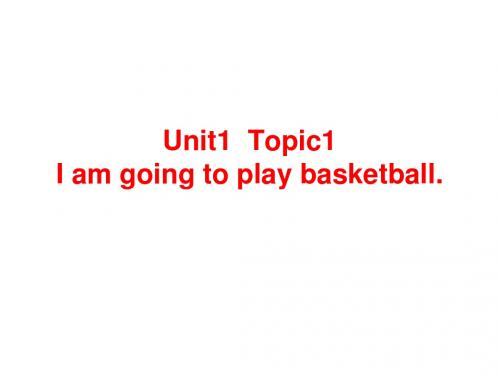
• popular adj.流行的,大众的,受欢迎的 all over 到处,遍及 world n.世界,地球 heart n.心脏,心;纸牌中的红桃 1ung n.肺;肺脏 the day after tomorrow 后天 healthy adj.健康的,健壮的 keep fit 保持健康 fit adj.健康的;适合的;v.(使)适合;安装 supper n.晚饭,晚餐 relax v.(使)放松,轻松 famous adj.著名的 teammate n.队友 excited adj.激动的,兴奋的 bad adj.令人不愉快的;坏的 leave v.离开;把……留下,剩下;n.假期,休假 1eave for 动身去某地 pity n.遗憾,可惜,同情,怜悯
Unit1 Topic1 I am going to play basketball.
against prep.对着,反对 • during prep.在...期间 team win n.队,组 v.获胜,赢得 cheer v.加油,欢呼;喝彩;n.欢呼声,喝彩声 football n.足球运动;足球;橄榄球 cheer...on 为...加油 practice v.& n练习,实践 prefer v.更喜欢,宁愿(选择) row v.划(船);n.(一)排,(一)行 quite adv.相当,很,十分 join v.加入,参加;连接 skate v.溜冰,滑冰;滑(滑板) n.网球 cycle v.骑自行车n.循环,周期 tennis table tennis 乒乓球 player n.运动员,比赛者,选手 rocket n.火箭 dream n.梦想,梦;v.做梦 grow v.成长,生长;发育;种植;变成 grow up 长大成人,成长 scientist n.科学家 future n.将来 in the future 今后 musician n.乐手,音乐家,乐师 pilot n.飞行员,驾驶员 policeman n.男警察 policewoman n.女警察 postman n.邮递员,邮差 fisherman n.渔民,钓鱼的人 jump v.& n.跳跃 spend v.度过;花费(金钱、时间等 exercise v.锻炼n.锻炼,练习 baseball n.棒球 be good at 擅长…,精通 weekend n.周末 part n.部分,一些,片段 take part in 参加,加入 be good for 对……有益 health n.健康,保健
八年级英语上册 unit1 How often do you exercise 教案 人教新目标版

4.time ,时间,倍数,次数
﹙1﹚作不可数名词“时间,时刻” Time is money.时间就是金钱。
作可数名词,“倍数,次数”Your house is 3 times as large as mine.
拓展:on time 按时
Ata time 一次,一度
A: Do you like it ?
B:No. But my mother wants me to drink it. She says it’s good for my health.
注意:Health 名词 健康Healthy 形容词 健康的
Keep healthy= keep in good health
1. What do you usually do on weekends? I usually surf the Internet.
2. How often do you surf the Internet? I surf the Internet twice a week.
3. What does he do on weekinds? He often watches TV.
辨析:hardly 与hard 区别:
hardly 不是hard 的副词形式,
hard 作形容词为“困难的,硬的”,做副词意为“努力地,猛烈地”
3.once
做副词,“一次”I see him once every month.我每周见他一次。
做副词,“昔日,曾经”I once lived in New York.我曾经在纽约住过。
What does he usually do on weekends? He usually does his homework.
人教版英语八年级上册Exercises for Unit 1
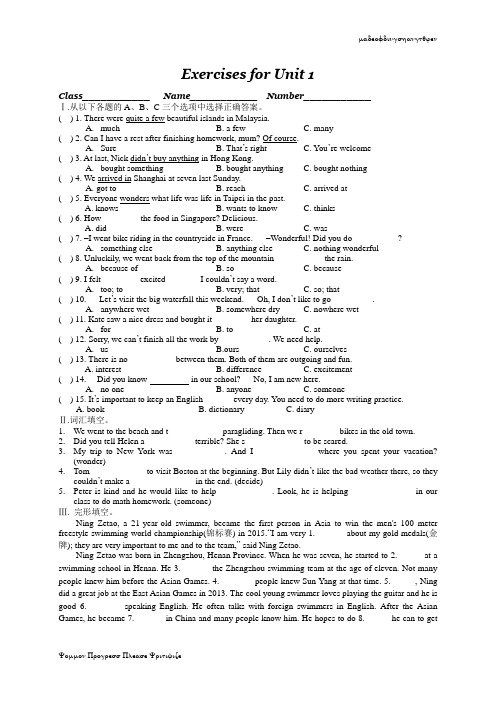
Exercises for Unit 1Class___________ Name___________ Number___________Ⅰ.从以下各题的A、B、C三个选项中选择正确答案。
( ) 1. There were quite a few beautiful islands in Malaysia.A.muchB. a fewC. many( ) 2. Can I have a rest after finishing homework, mum? Of course.A.SureB. That’s rightC. You’re welcome( ) 3. At last, Nick didn’t buy anything in Hong Kong.A.bought somethingB. bought anythingC. bought nothing( ) 4. We arrived in Shanghai at seven last Sunday.A. got toB. reachC. arrived at() 5. Everyone wonders what life was life in Taipei in the past.A. knowsB. wants to knowC. thinks( ) 6. How ________ the food in Singapore? Delicious.A. didB. wereC. was( ) 7. –I went bike riding in the countryside in France. –Wonderful! Did you do __________?A.something elseB. anything elseC. nothing wonderful( ) 8. Unluckily, we went back from the top of the mountain___________ the rain.A.because ofB. soC. because( ) 9. I felt ________ excited _______ I couldn’t say a word.A.too; toB. very; thatC. so; that( ) 10. --- Let’s visit the big waterfall this weekend. --- Oh, I don’t like to go _________.A.anywhere wetB. somewhere dryC. nowhere wet( ) 11. Kate saw a nice dress and bought it ________ her daughter.A.forB. toC. at( ) 12. Sorry, we can’t finish all the work by ___________. We need help.B.oursC. ourselves( ) 13. There is no __________ between them. Both of them are outgoing and fun.A. interestB. differenceC. excitement( ) 14. ---Did you know _________ in our school? --- No, I am new here.A.no oneB. anyoneC. someone( ) 15. It’s important to keep an English ______ every day. You need to do more writing practice.A. bookB. dictionaryC. diaryⅡ.词汇填空。
人教版八年级上册英语Unit-1-5-全部词汇详解课件(137页)全文

taste it.
prep. & adv. 在……下面; 到……下面
反义词: above,意为“超过;在……上面”。 例句: ◆ From the top of the building, I could
短语:twice a week 一周两次 think twice 再三考虑
例句: ◆ I go to the movies twice a week. ◆ The ruler is twice as long as that one.
拓展: “一次”用once,“两次”用twice, “三次及以上”用“基数词+times” 如:twice a day, four times a year
dislikes.
Unit 2 How often do you exercise?
Section A
n.家务劳动; 家务事
构成: house(n. 房子)+ work( n. 工作) 短语:do (the) housework 做家务 例句:
◆ He is too lazy so he hardly does housework.
拓展:enjoyable 的相关词 enjoy: v. 享受;喜爱 enjoyment: activities 例句: The park is a popular place
for relaxing activities.
v. 决定;选定
句型: decide (not) to do sth. 决定(不)做某事 decide+“疑问词+动词不定式” decide+宾语从句 decide on sth. 就某事做决定;选定某事 例句:
人教版八年级上册英语Unit1复习
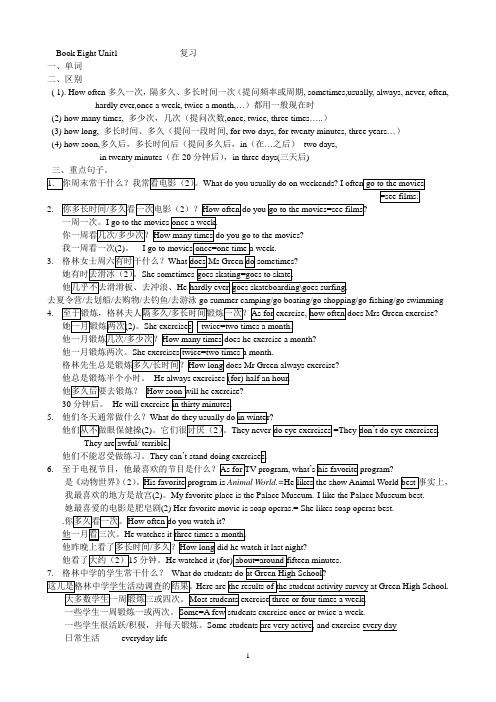
Book Eight Unit1 复习一、单词二、区别( 1). How often多久一次,隔多久、多长时间一次(提问频率或周期, sometimes,usually, always, never, often, hardly ever,once a week, twice a month,…)都用一般现在时(2) how many times, 多少次,几次(提问次数,once, twice, three times…..)(3) how long, 多长时间、多久(提问一段时间, for two days, for twenty minutes, three years…)(4) how soon,多久后,多长时间后(提问多久后,in(在…之后)two days,in twenty minutes(在20分钟后),in three days(三天后)三、重点句子。
去夏令营/去划船/去购物/去钓鱼/去游泳go summer camping/go boating/go shopping/go fishing/go swimming4.305.6.是我最喜欢的地方是故宫(2)。
My favorite place is the Palace Museum.-I like the Palace Museum best.她最喜爱的电影是肥皂剧(2) Her favorite movie is soap operas.= She likes soap operas best.日常生活everyday life为“看电视”的(调查)结果是有趣的。
The results for “watching TV” are interesting.8./可乐?How often does the funny person drink milk/drink coffee/cola?他一天喝一次。
/他喝很少的可乐。
妈妈说它对我的健康有好处。
八年级上册英语知识点归纳-Unit1
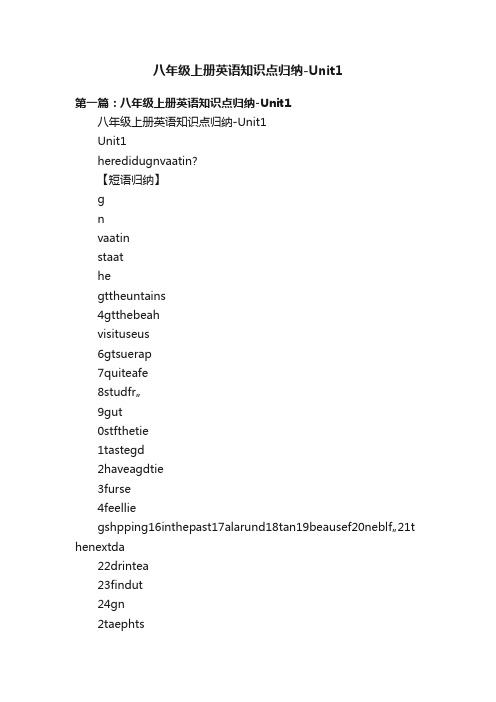
八年级上册英语知识点归纳-Unit1第一篇:八年级上册英语知识点归纳-Unit1八年级上册英语知识点归纳-Unit1Unit1heredidugnvaatin?【短语归纳】gnvaatinstaathegttheuntains4gtthebeahvisituseus6gtsuerap7quiteafe8studfr…9gut0stfthetie1tastegd2haveagdtie3furse4feelliegshpping16inthepast17alarund18tan19beausef20neblf…21t henextda22drintea23findut24gn2taephts26sethingiprtant27upanddn28eup【语法】buanthingspeial买特别的东西①busthfrsb=busbsth②anthing不定代词,意为“某事;某东西”,主要用于疑问句或否定句中。
表示“任何事;任何东西”时,主要用于肯定句。
③anthingspeial特别的东西,形容词修饰不定代词时应后置Hdidulieit?你觉得它怎么样?=hatduthinf…?Didugshpping?你们去购物了吗?g+ding表示去做某事,常用于表达从事某一体育活动或休闲活动gfishinggsiing…Thenlprbleasthatthereasnthinguhtdintheeveningbutread唯一的问题是晚上除了读书没什么事情可做。
Nthinguhtd没什么事可做nthing…but…除…之外什么也没有,but后可接名词或动词原形。
Stillnneseeedtbebred仍然没有人看起来无聊see可作不及物动词或连系动词,意为“好像,似乎,看来”see+形容词看起来。
useehapptdasee+tdsth似乎,好像做某事IseethavealdItsee/seeed+从句看起来好像。
人教版英语新八年级上册第一单元知识点总结

Unit1 How often do you exercise?重难点讲解及练习1. How often do you shop? 疑问词how的用法(1)怎样,用什么手段,方法/交通工具How are you? / How is she?How did he do it? / I don’t know how to swim.How do you come to school?(2) 情况如何(指身体健康状况)How are you?(3) how many,how much表示“多少”how many后接可数名词复数,how much接不可数名词。
How many times do you go to the park?How many pens do you want?How much water do we drink every day?How much are those pants?(4) how often是对动作发生的“次数”提问,询问的是频率“多久一次”回答可以是:Every day. / Once a week. / Three times a week. / Often. / ...How often do you play tennis?How often do you surf the Internet.(5) How old...? 询问年龄How old are you? I am five.(6) How about…? ……如何?……怎么样?How about going to the movies?练习:选择how, how many, how much, how old, how about, how often填空。
(1). ________ is your mother? She’s fine, thanks.(2). _________ do you watch TV?(3). _________ apples do you have? Three.(4). _________ are these pants? They’re two dollars.(5). I’m free this afternoon. ________ going for a walk?2. Some students do homework three or four times a week.time表示不可数名词,意为“时间”。
人教版初中英语八年级上册基础过关Unit1 Where did you go on vacation
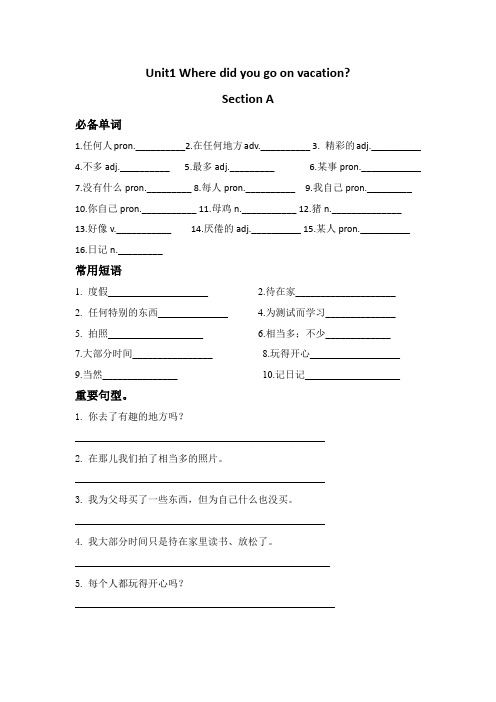
Unit1 Where did you go on vacation?Section A必备单词1.任何人pron.__________2.在任何地方adv.__________3. 精彩的adj.__________4.不多adj.__________5.最多adj._________6.某事pron.____________7.没有什么pron._________8.每人pron.__________9.我自己pron._________ 10.你自己pron.___________ 11.母鸡n.___________ 12.猪n.______________ 13.好像v.___________ 14.厌倦的adj.__________ 15.某人pron.__________ 16.日记n._________常用短语1.度假____________________2.待在家____________________2.任何特别的东西______________ 4.为测试而学习______________5.拍照___________________6.相当多;不少_____________7.大部分时间________________ 8.玩得开心__________________9.当然_______________ 10.记日记___________________重要句型。
1.你去了有趣的地方吗?__________________________________________________2.在那儿我们拍了相当多的照片。
__________________________________________________3.我为父母买了一些东西,但为自己什么也没买。
__________________________________________________4.我大部分时间只是待在家里读书、放松了。
人教版初中英语八年级Unit 1 测试卷(附答案)
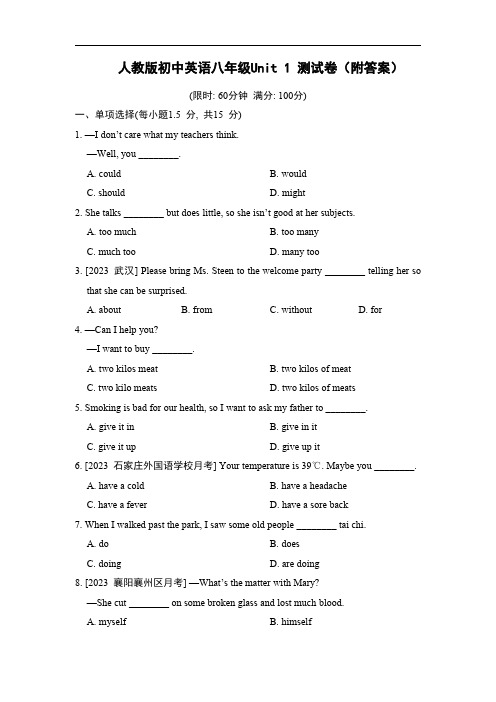
人教版初中英语八年级Unit 1 测试卷(附答案)(限时:60分钟满分:100分)一、单项选择(每小题1.5分,共15分)1.—I don’t care what my teachers think.—Well,you________.A.couldB.wouldC.shouldD.might2.She talks________but does little,so she isn’t good at her subjects.A.too muchB.too manyC.much tooD.many too3.[2023武汉]Please bring Ms.Steen to the welcome party________telling her so that she can be surprised.A.aboutB.fromC.withoutD.for4.—Can I help you?—I want to buy________.A.two kilos meatB.two kilos of meatC.two kilo meatsD.two kilos of meats5.Smoking is bad for our health,so I want to ask my father to________.A.give it inB.give in itC.give it upD.give up it6.[2023石家庄外国语学校月考]Your temperature is39℃.Maybe you________.A.have a coldB.have a headacheC.have a feverD.have a sore back7.When I walked past the park,I saw some old people________tai chi.A.doB.doesC.doingD.are doing8.[2023襄阳襄州区月考]—What’s the matter with Mary?—She cut________on some broken glass and lost much blood.A.myselfB.himselfC.herselfD.yourself9.—When did it start?—________.A.About a week agoB.TomorrowC.It started with nothingD.In the future10.—We shouldn’t worry about Mary.—You are right.She is________to look after________.A.old enough;herselfB.tall enough;herselfC.enough old;herD.enough tall;her二、完形填空(每小题1.5分,共15分)Some people think that wealth(财富)can give them happiness.They think money can usually11them a better life and make them feel happy.Others have a12idea.They think that money is not the most13.They need more things than just money to live a happy life.They think money can be good only when one knows14to use it.Money is important but it’s not15.There are more important things,such as health,friends and family.I don’t think one can be happy without a16body. We should have the goal to work hard and live a good life but we should also17 to keep healthy.Also,money cannot get us18who truly care about us and are willing(愿意的)to share our feelings.Money cannot19us family happiness. As the saying goes,“Happy is he who is content(满足的)”.So friends,whether you’re rich20poor,be content with what you have.This will make you feel happy all the time.11.A.bring B.take C.show D.leave12.A.same B.right C.wrong D.different13.A.interesting B.important C.boring D.beautiful14.A.how B.why C.who D.what15.A.nobody B.nothing C.everybody D.everything16.A.sick B.poor C.healthy D.weak17.A.exercise B.read C.travel D.study18.A.doctors B.children C.friends D.parents19.A.pass B.show C.buy D.talk20.A.and B.or C.so D.but三、阅读理解(每小题2分,共10分)Luo Han,a9-year-old boy,exercises for at least two hours every day.His habit of exercising is due to his father Luo Ge,who actively encourages him to enjoy nature, rather than caring only about his learning.And this has raised lots of discussion online.Many agree with the father!“Many of us students have too much schoolwork, and exercise can make us relaxed,so outdoor activities are necessary,”said Liu Yu, 18,a college student.Wang Tao,a parent of a16-year-old,thinks so as well.“It’s more than a way to relax.It’s a training of willpower(意志力),”she says.But some also have worries.“Two hours isn’t too much for a9-year-old,but it might be difficult for high school students.With so much schoolwork in high school, we don’t have so much time to exercise at all,”says Huang Xi,from Liyang High School of Jiangsu Province.Ms Zhu,who has a daughter in middle school,also thinks that two hours is too much for the students and parents.“After work,I need to do housework.After my daughter finishes her homework,she wants to watch TV.Neither of us would think of going outside for exercise,”Zhu says.Other parents are worried about the safety of outdoor activities,even though the time for exercise is not a problem.21.What does Liu Yu do?A.A runner.B.A coach.C.A P.E.teacher.D.A college student.22.What does Wang Tao think of Luo Han’s habit of exercising?A.Hard.B.Impossible.C.Helpful.D.Boring.23.What does Ms Zhu have to do after work?A.Do housework.B.Do sports.C.Help her kids with homework.D.Rest.24.Which of the following best shows the structure of the passage?(①=Paragraph1)A. B.C. D.25.Which is the best title of the passage?A.Different Exercise HabitsB.Different Ideas on a Boy’s Habit of ExercisingC.Outdoor Activities after WorkD.A Hard-Working Boy四、词汇运用(每小题1分,共10分)A)根据句意及汉语提示写单词。
- 1、下载文档前请自行甄别文档内容的完整性,平台不提供额外的编辑、内容补充、找答案等附加服务。
- 2、"仅部分预览"的文档,不可在线预览部分如存在完整性等问题,可反馈申请退款(可完整预览的文档不适用该条件!)。
- 3、如文档侵犯您的权益,请联系客服反馈,我们会尽快为您处理(人工客服工作时间:9:00-18:30)。
Exercises for Unit 1
Class___________ Name___________ Number___________
Ⅰ.从以下各题的A、B、C三个选项中选择正确答案。
( ) 1. There were quite a few beautiful islands in Malaysia.
A.much
B. a few
C. many
( ) 2. Can I have a rest after finishing homework, mum? Of course.
A.Sure
B. That’s right
C. You’re welcome
( ) 3. At last, Nick didn’t buy anything in Hong Kong.
A.bought something
B. bought anything
C. bought nothing
( ) 4. We arrived in Shanghai at seven last Sunday.
A. got to
B. reach
C. arrived at
() 5. Everyone wonders what life was life in Taipei in the past.
A. knows
B. wants to know
C. thinks
( ) 6. How ________ the food in Singapore? Delicious.
A. did
B. were
C. was
( ) 7. –I went bike riding in the countryside in France. –Wonderful! Did you do __________?
A.something else
B. anything else
C. nothing wonderful
( ) 8. Unluckily, we went back from the top of the mountain___________ the rain.
A.because of
B. so
C. because
( ) 9. I felt ________ excited _______ I couldn’t say a word.
A.too; to
B. very; that
C. so; that
( ) 10. --- Let’s visit the big waterfall this weekend. --- Oh, I don’t like to go _________.
A.anywhere wet
B. somewhere dry
C. nowhere wet
( ) 11. Kate saw a nice dress and bought it ________ her daughter.
A.for
B. to
C. at
( ) 12. Sorry, we can’t finish all the work by ___________. We need help.
B.ours
C. ourselves
( ) 13. There is no __________ between them. Both of them are outgoing and fun.
A. interest
B. difference
C. excitement
( ) 14. ---Did you know _________ in our school? --- No, I am new here.
A.no one
B. anyone
C. someone
( ) 15. It’s important to keep an English ______ every day. You need to do more writing practice.
A. book
B. dictionary
C. diary
Ⅱ.词汇填空。
1.We went to the beach and t____________ paragliding. Then we r________ bikes in the old town.
2.Did you tell Helen a___________ terrible? She s_____________ to be scared.
3.My trip to New York was ___________. And I _____________ where you spent your vacation?
(wonder)
4.Tom ____________ to visit Boston at the beginning. But Lily didn’t like the bad weather there, so they
couldn’t make a ______________ in the end. (decide)
5.Peter is kind and he would like to help ____________. Look, he is helping ______________ in our
class to do math homework. (someone)
Ⅲ. 完形填空。
Ning Zetao, a 21-year-old swimmer, became the first person in Asia to win the men's 100 meter freestyle swimming world championship(锦标赛) in 2015.“I am very 1. ______ about my gold medals(金牌); they are very important to me and to the team,” said Ning Zetao.
Ning Zetao was born in Zhengzhou, Henan Province. When he was seven, he started to 2. _____ at a swimming school in Henan. He 3. ______ the Zhengzhou swimming team at the age of eleven. Not many people knew him before the Asian Games. 4. _______ people knew Sun Yang at that time. 5. _____, Ning did a great job at the East Asian Games in 2013. The cool young swimmer loves playing the guitar and he is good 6. _______ speaking English. He often talks with foreign swimmers in English. After the Asian Games, he became 7. ______ in China and many people know him. He hopes to do 8. _____ he can to get。
